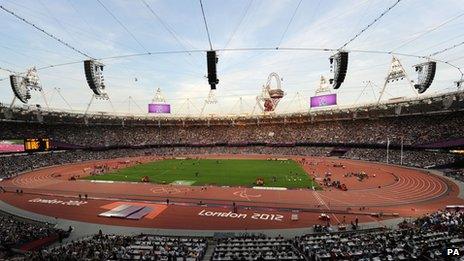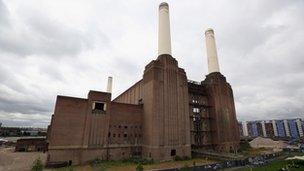London 2012 Olympics 'have boosted UK economy by £9.9bn'
- Published

The London Olympic Games took place in July and August last year
The UK economy has seen a £9.9bn boost in trade and investment from hosting the 2012 London Olympic and Paralympic Games, research suggests.
A report by the government department which promotes UK businesses put new contracts, sales and foreign investment in the last year down to the Games.
But the claims were met with scepticism by some economists and the Federation of Small Businesses.
Government estimates put the cost of hosting the Games at £8.9bn.
'Creative accounting'
Prime Minister David Cameron said "a lot of deals were done" around the time of the Olympics.
The report, for the UK Trade and Investment department (UKTI), said the Olympics resulted in:
£2.5bn "additional inward investment", 58% of which was outside London
£5.9bn additional sales following Olympic-related promotions by the Foreign Office and UKTI
£1.5bn high value overseas contracts - such as helping to design venues in other host-nations
Much of the Olympic park and stadium for the Winter Olympics in Russia was "designed and built by British businesses", Mr Cameron told BBC Radio's Test Match Special.
"So there's real jobs, real money in the Olympics if we get it right."
But sports economist Stefan Szymanski said it was impossible to tell how much of the economic activity could be put down to the Games.
"It's almost like a bit of creative accounting. There's no way of testing whether what they're saying is really true."
Jonathan Portes, director of the National Institute of Economic and Social Research and a former chief economist at the Cabinet Office, said attributing the economic benefits to the Olympics was "a little far-fetched to say the least".
Business Secretary Vince Cable defended the figures in the report.
"A lot of people were very cynical about this... but as a result of all the work that was done we have this very considerable amount," he said.
He added there was an "upward estimate" that, by 2020, the Games could have benefited the UK by as much as £40bn.
'Thrilling chapter'
One engineering firm which was behind the Olympic park on the 2012 site said the Games had boosted its standing with other host countries and governments delivering large-scale transport and urban regeneration projects.
Vince Cable: "A very considerable net benefit is going to come to the UK from the Games"
Mike McNicholas from the Atkins consultancy said: "What we saw in the run-up to the games was a huge interest from overseas governments and industry to look at how the Games was delivered."
But for businesses outside London, The Federation of Small Businesses said the impact of the Games had been a disappointment.
"The contracts we were expecting really didn't materialise," said national policy chairman Mike Cherry.
As well as the financial impact of the Games, the report, external - Inspired by 2012: The legacy from the London 2012 Olympic and Paralympic Games - highlights its influence on sport and regeneration.
It also says the Games volunteers inspired more people to take up similar roles in their communities.
The National Council for Voluntary Organisations said there had been an "encouraging" boost to volunteering. But funding cuts to the voluntary sector left a "question mark" over the Games' legacy, executive director Justin Davis-Smith warned.
The prime minister said: "If you go back to when we first won the Olympics in 2005, we've got 1.4 million more people taking part in sport every week."

The purchase of Battersea Power Station was among the post-Games deals cited in the report
But BBC sports editor David Bond said in the last year participation had actually dropped by 200,000.
Labour's Olympics spokeswoman Tessa Jowell called on the government to reverse the "damage inflicted" to school sport funding.
The report also found that employment programmes by Boris Johnson the Mayor of London had failed to deliver long-term Olympic jobs for the capital with only a fraction of people going into the jobs predicted.
In a message in the report, Olympics legacy ambassador Lord Coe, who chaired Games organiser Locog, said: "Progress reflected in this report against each of the legacy commitments is a promising start.
"There can, however, be no room for complacency. Just as the Games took 10 years to win, plan and deliver, so legacy must be seen as a 10-year project to realise lasting change."
International Olympic Committee president Jacques Rogge said: "The London 2012 Games have definitively served as a catalyst for development and improvements, both tangible and intangible, which would otherwise have taken decades to achieve."
- Published19 July 2013
- Published16 May 2013
- Published24 January 2013
- Published7 December 2012
- Published19 November 2012